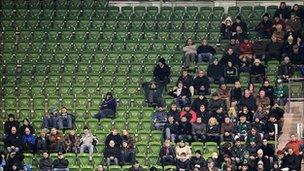Irish struggle with eye-watering austerity
- Published

Many more seats would have been filled for such a big game a few years ago
The thousands of empty seats at the first rugby international at Dublin's new sports stadium were the latest indicators of the Republic of Ireland's economic woes.
Under normal circumstances, the visit of world champions South Africa to this rugby-mad country would have guaranteed a sell-out. Not on Saturday.
The empty green seats were a sign of empty Irish pockets.
Admittedly the tickets were very expensive, and more than half of the new Aviva stadium was filled, but if ever there was a day which demonstrated that Irish people are feeling the pinch in the eurozone, this was it.
The EU's Economy and Monetary Affairs Commissioner, Olli Rehn, is visiting Dublin for some serious number-crunching.
Painful cuts
The figures, for a small country, are frightening:
Ireland must make 15bn euros (拢13bn) in savings by 2014
Next year alone, it has to make 6bn euros in cuts
Public spending will drop by 4.5bn euros next year
Tax rises are expected to raise 1.5bn euros.
The cutbacks will be the most severe in Irish history. Details will be revealed in the next budget, on 7 December.
Before then, the government will outline a four-year plan to reduce its financial black hole.
The aim of the Irish Finance Minister, Brian Lenihan, is to try to avoid having to go to the European Union or the International Monetary Fund to seek a Greek-style financial bail-out.
Ireland is proud of its independence and anxious to retain as much control of its own affairs as possible.
However, there is no doubt that the European Commission is becoming a financial "big brother", keeping a watchful eye on Dublin.
No sooner had the ink dried on the statement last week by Mr Lenihan about the need for a 6bn-euro saving in next month's budget, there was an an EU response.
Olli Rehn said: "I welcome the continued commitment to reducing the deficit to below 3% by 2014. This provides an important anchor for financial markets and also underlines the Irish authorities' commitment to putting public debt on a sustainable downward path in the near future."
The statement added: "Commissioner Rehn is looking forward to discussing further details of the Irish government's four-year budgetary plan."
Fragile coalition
One of the questions Mr Rehn may wanted answered is: How long can the current Irish government survive?
The Fianna Fail-Green Party coalition is looking shaky. Its majority in the Irish parliament (Dail) has slipped to just three seats - and there are four by-elections pending.
Never mind the four-year budgetary plan, some believe the government will not last another four months.
An election before Christmas cannot be ruled out. The collapse of the government within the next six months is the prediction of most political commentators.
The unemployment rate is above 13% and there is little prospect of it dropping much below that figure in the next year.
An estimated 100,000 people are expected to emigrate by 2014, with Australia and New Zealand among the most popular destinations for work-seeking young Irish men and women.
From boom to bust
The demise of Ireland's Celtic Tiger economy has been spectacular. The IMF described it as the deepest recession of any advanced country.
Ireland's boom was built on the success of the construction industry, fuelled by cheap loans.
The total cost of rescuing Ireland's banking sector is expected to be 50bn euros.
However, Ireland is still enjoying at least some of the benefits of the boom years, like the new 410m-euro Aviva stadium.
It is a spectacular sporting theatre, and the 35,000 spectators present at the weekend witnessed a thrilling finish as Ireland scored two late tries against South Africa.
Having trailed 23-9, Ireland battled back to within three points of victory, but a 75-minute kick hit the post and Ireland lost.
Ireland's rugby fightback ended in bitter defeat.
Its economic battle is ongoing - and it cannot afford to fail.
- Published8 November 2010
- Published4 November 2010
- Published21 May 2012
- Published3 November 2010
- Published3 November 2010